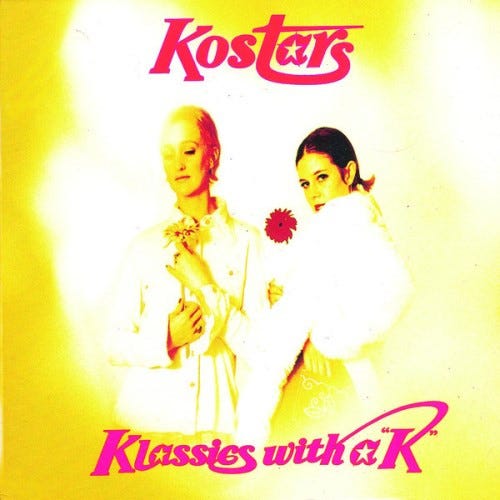So It Goes 2023 7: Mick Mars sues Mötley Crüe, RIP Vivian Trimble of Luscious Jackson
Plus Seymour Stein, Caroline Rose, Boygenius, Crazy Horse
Don’t Go Away Mad, Mick Mars (Just Go Away)
Blame it on growing up with Girls, Girls, Girls and Dr. Feelgood thrumming in the background of high school but I've never had much interest in the drama surrounding Mötley Crüe. That changed this week when guitarist Mick Mars sued the rest of the band, claiming that Nikki Sixx, Tommy Lee, and Vince Neil are attempting to force him out of the Crüe. The dispute hinges on Mars deciding last fall that his chronic illness—a variation of arthritis that leads to vertebrae fusing—has gotten to the point where he can no longer tour. The Crüe took this retirement from the road as Mars resigning from the whole organization, the guitarist maintains he still holds equity in the brand he's built, so the lawsuits are flying.
The particulars of the squabble are fairly rich but not as dishy as the dirt Mars spilled to Chris Willman in Variety. Unleashing four decades of resentment, Mars claims he "carried those bastards for years," that the other three guys have been trying to replace him since way back in 1987, that he's the only one who has been playing without the assistance of pre-recorded tapes. The grievances don't read as petty, nor do they seem like inventions. Mars always seemed out of step with the rest of Mötley Crüe: not only was he ten years older than Vince Neil and Tommy Lee, he lurked upon the margins as if he somehow escaped from the crypt. He grounded the Crüe in genuine grime, a crucial element in the records that arrived prior to the gleaming makeover Bob Rock gave to the band on Dr. Feelgood. Their biggest hit by a considerable margin, Dr. Feelgood snagged the band a $25 million contract renewal in the early 1990s that immediately looked like a bad bet once the group's volatile internal chemistry combusted as they attempted to chase alt-rock reinvention.
Mötley Crüe eventually got back together because that's what old rock stars do: sure, they can't leave money on the table but they also have nothing else to do but play rock & roll. Mick Mars kept playing until he literally couldn't take it anymore: as the 71-year-old told Willman, "My body just doesn't wanna do it." Reading between the lines in the Variety interview, it could be argued that the other members of Mötley Crüe are facing a similar point of no return. Mars says "Nikki's bass was 100% recorded" and that "a lot" of Lee's drums were also on tape, not to mention some of Neil's vocals. All of this isn't exactly surprising, considering that the Crüe are charging into their sixties, an age where physical capabilities tend to diminish. This essential fact gets lost by the band's very presence on the road suggesting that they're a hardy bunch that can withstand all the damage.
It's a similar situation with nearly any rock band touring in 2023. By virtue of playing shows, rockers seem younger than they are, an illusion that gets heightened by how Mick Jagger, Paul McCartney, and Bruce Springsteen are able to perform marathon shows while in their 70s. The Mars lawsuit hints at how much effort it takes to sell this mirage, particularly in how everything in the production is geared toward spectacle, not band interplay. After decades of hydraulic drum rosters, fans expect the same old fireworks to accompany the same old songs. Mars laughed to Willman "I mean, 40 years of playing the same eight songs, you know," but the repetition is the point of the whole shebang: it's a ritual, not a moment in time. Whether it's retirement, hiatus or death, any crack in the facade spoils the fantasy that nobody in the band or audience has grown any older in the intervening years.
Given all the sparring in Mötley Crüe over the years, the acrimonious Mars departure doesn't seem as jarring as Larry Mullen Jr.'s hiatus from U2 but it's on the same continuum: they both played until their bodies gave out. Maybe Mullen will return to the stage after a prolonged period of rest and recuperation but the fact remains that all the old rockers are much older than most of us acknowledge. Expect more high-profile retirements and hiatuses—and likely lawsuits—in the future.
Vivian Trimble (1963-2023)
Vivian Trimble left Luscious Jackson in 1998, just prior to the group recording their last album of the 1990s, Electric Honey. A founding member of the loose-limbed, funky alt-rock outfit, Trimble already showed signs of tiring of the grind. She stepped away with bandmate Jill Cunniff to form Kostars, who released their lone album six months before Luscious Jackson delivered Fever In Fever Out, the brightly colored record that gave the group their lone Top 40 hit in "Naked Eye." Trimble teamed with Breeder Josephine Wiggs for Dusty Trails, a duo that split after releasing an eponymous album in 2000. After that, Trimble retreated from music, raising two children with her husband in New York City. Her death from cancer on April 4, 2023 provides an opportunity to not only revisit the Lucious Jackson records—I personally prefer the noir-ish lo-fi funk of the 1992 EP In Search of Manny, although the glossier Natural Ingredients and Fever In Fever Out do have considerable appeal—but Klassics With A "K", the Kostars album from 1996. I have not listened to the album since its year of release so I wasn't prepared for how it ties together the shagginess of Manny with the smooth grooves of Natural Ingredients. Spacey without being trippy, retro without being a throwback, it's a quintessentially 1990s record where the vibe means as much as the songs, but it does have several sturdy pop tunes too, including Trimble's "Don't Know Why" where Kostars duet with their Grand Royal labelmates Gene and Dean Ween. Low-key without being slack, it's a thoroughly charming record that's worthy of a revisit.
Seymour Stein (1942-2023)
An absolute titan in the 20th Century music business, Seymour Stein would've secured his place in history if he had only discovered either the Ramones or Madonna. He not only signed those two to his Sire but he also brought in a wealth of other vital talents to Sire, either through direct signings or licensing. My obituary for the Los Angeles Times.
Caroline Rose—The Art of Forgetting
Three albums in, it's clear Caroline Rose is more of an arty singer/songwriter than an Americana. That's mostly for the good: The Art of Forgetting, like Superstar before it, succeeds as much on texture and aesthetic as pure songwriting. I could do without the voicemails from grandma, though. My review at Pitchfork.
Boygenius—The Record
It's likable, especially since it's designed as an egalitarian collective: Phoebe Bridgers, Lucy Dacus, and Julien Baker all have an equal presence on The Record, giving the album the feeling of the work of a genuine band. That means The Record doesn't sustain a mood the way that, say, Punisher does, but I think that's why I like it better—it's messier, plus with crunching numbers like "Satanist," it's hookier too. My Xperi/Allmusic review.
Talbot, Molina, Lofgren & Young—All Roads Lead Home
I don't know why All Roads Lead Home isn't credited to Crazy Horse. Maybe it's out of respect for Frank "Poncho" Sampedro, who retired in the mid-2010s due to arthritis? (Shades of Mick Mars there.) If that's the case, why does the lineup of Ralph Molina, Billy Talbot, and Nils Lofgren get called Crazy Horse whenever they back up Neil Young, which is quite often these days? Ultimately, the billing doesn't matter because All Roads Lead Home is exactly what anybody listening to Barn or World Record would expect: amiable, shaggy songs from old hippies pondering a world gone wrong. It's a bit too ragged for its own good, partially because Talbot and Molina can't quite compete with Lofgren as a songwriter, which is only a problem if you're seeking songs from this quartet and not a serious vibe. (For what it's worth, Neil's presence is negligible here.) My Xperi/Allmusic review.
Luke Combs—Gettin' Old
Much, much longer than its companion Growin' Up, Gettin' Old is simply more of the same from Luke Combs: polished, polite product designed to please every quadrant of the country audience. Like Morgan Wallen's interminable One Thing At A Time, it's impossible to shake the notion that this is meant as nothing more as grist for the algorithmic mill but Combs has a warmer, lighter touch and that counts for a lot: unlike Wallen, Combs never seems like he's peddling good times. My Xperi/Allmusic review.





